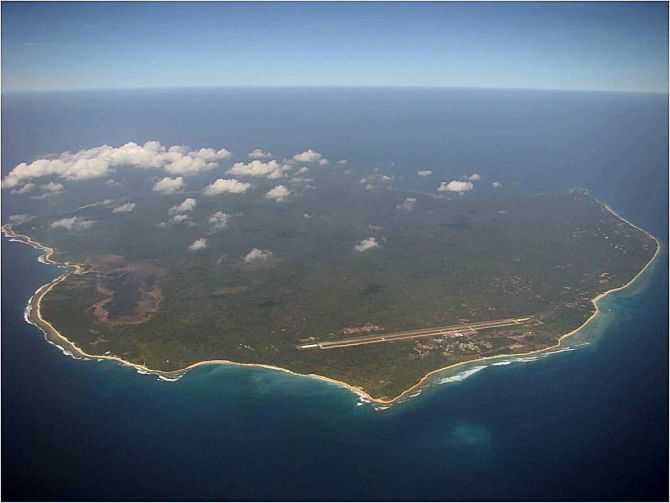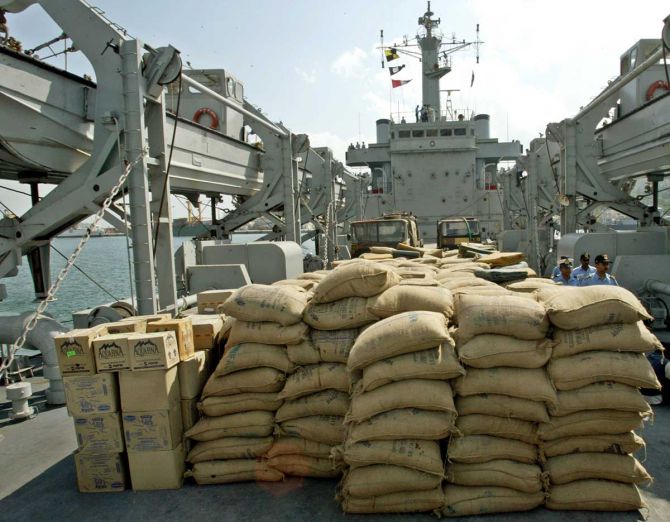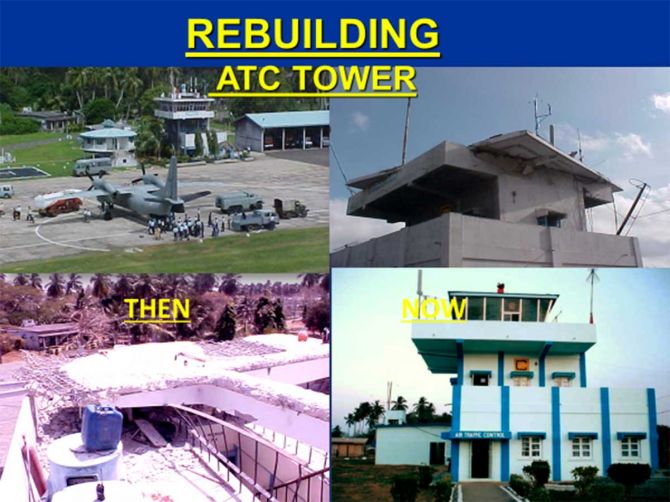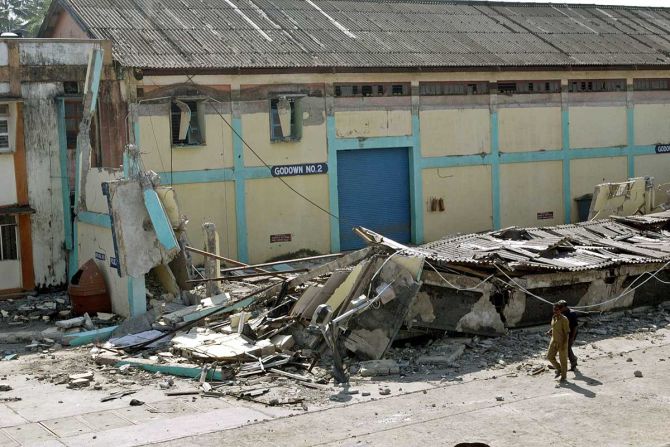 | « Back to article | Print this article |
'Wanting to see the bright side of things, we always told ourselves, 'It could have been worse!', when the situation got tough.'
Air Commodore Nitin Sathe (retd), who helped rebuild the IAF's Car Nicobar air base after the 2004 tsunami, recalls the devastation on United Nations World Tsunami Awareness Day.

'Baba, what is a Soonami?'
My young daughter asked me this question as I packed my luggage on the evening of 26th of December 2004 to leave for the Andamans.
It was to be an adventure that changed the way I looked at life.
The tsunami had just ravaged the land surrounding the Indian Ocean region that morning and news was just about filtering in.
I too didn't know much about what a tsunami was either and so did so many of us.
Having volunteered to go there as part of the rescue efforts of the Indian Air Force, I was soon to learn about this 'act of god' on the job!

Today, the word tsunami has found use in many grammatical forms and in the spoken language to depict hugeness or massive proportions of anything and everything.
The world is going through a 'tsunami' of a pandemic as we endeavour to remember the giant waves of the tsunami to commemorate the United Nations World Tsunami Awareness Day.
Let me take you through the few things that I learnt about life while carrying out rescue, relief and rehabilitation work on the island of Car Nicobar in the south Andamans in one of the biggest human tragedies that humankind has seen.
There is so much to tell about my experiences, but the word count is the limiting factor, and therefore, if you are interested to find out more, you could look up my book, A Few Good Men & the Angry Sea (Vitasta Publishing).

As we landed on the islands and took charge of things, the enormity and severity of the disaster overwhelmed us.
Everything was topsy turvy. Giant trees lay uprooted, bright corals lay ripped from their roots in the ocean interspersed with carcasses of humans, fish and livestock.
Buildings lay in a heap, the innards of homes mixed with concrete were littered as far as the eye could see and there was a sickening stench of rotting flora and fauna mixed with the salty air of the sea which clung to our lungs.
We saw for ourselves how the giant hand of God had ripped through the lives and livelihoods of the thousands who lived along the coasts of nations in the Indian Ocean.

The situation we faced reminded me of driving a car on a dark and unknown road at night without headlights.
And when you did put the lights on, one could make out things just a few yards in front.
What lay beyond that still remained a mystery.
This is exactly how the situation was panning out for us.

'We', were the 70 'rehabilitators' (we liked to call ourselves that) who reached the islands of the Andamans within 4 days of the tsunami.
What we saw was beyond our worst imagination.
As soon as we landed, the earlier lot of men at the airbase went away, flown to the mainland to recuperate after being through this earth shattering and nerve-racking event.
I wrote in my diary that night, 'As soon as the aircraft took off for the mainland, an eerie silence prevailed, broken only by the whining of the wind and the roar of the waves.'
'We are all alone on the island, marooned amidst destruction- our adventure is about to begin!'.

And what an adventure it was! As I look at the pictures of those times today, the memories of the hectic one year of drama and tension unwind before my eyes-as if the event happened yesterday.
Each day was special, each day brought with it new adventures and each day taught us so many things that one can't learn from books or teachers.
Remember that we were in the back of beyond, cut off from the mainland on which we depended on for our sustenance; and even a broken shoelace was an emergency, one had make do with some improvisation to keep the shoe in place till the shoelace arrived from the mainland by air.

The tsunami was our ultimate teacher and it taught us many a thing about management that one can't learn from books and also taught us how we should lead our lives.
I do believe that the COVID-19 pandemic is also churning out similar lessons for all of us.
We need to learn and learn fast to get back to leading normal lives, rather than being befuddled and in a sorry state of mind.
Let me bring you the top five learnings from the disaster that we went through in 2004.

Never give up
One of the most important lessons we learnt was to never give up whatever be the adversity.
Amidst the death and destruction, we showed extreme tenacity and will power to achieve our end goals.
There were numerous pulls and pressures and no plan really worked in totality; so, it was innovativeness and the ability to take quick and timely decisions as the situation developed (like a racy movie) that saved the day for us.
There were also times when the situation got the better of us and one felt like giving up, but then we had good leadership which pulled us out of the muddle and egged us on.

The tribal population was so resilient-they got back to their lives almost as soon as the waves receded.
We got to learn a thing or two about resilience and this became a part of our lives.
When the going gets tough the tough get going'-an adage we were taught during training was seen for real now.

Minimalistic living
Our day to day lives are all about how well we handle our logistics.
In a disaster situation, getting the right logistics at the right time was important; it was sometimes a question of life and death too.
The demands were high and the supply limited.
So, we learnt to live within the means and also to innovate and prioritise our requirements.
From a pin to an aircraft spare; from fuel to food -- all had to be well planned and managed.
While one could plan well, the immediate and emergency demands made logistics a nightmare.
I remember, in the evenings over dinner, we sat down together and took stock of the situation and decided what needed to come in by the next airplane.
There were some tough decisions to be made, all in the interest of the work at hand.
There was shortage of food, fuel, water and medicines and we realised that water was the most important requirement for survival.
Even today I get unnerved when I see water being wasted due to neglect and poor management.
We must learn to live with the minimum and that is the key to future life.

Understanding humans and being humane.
We were a group of 70 warriors pulled out from various places to work together as a team.
One had to understand and respect each other and quickly work as a 'team' rather than as a 'group' with one goal of getting back to normalcy.
Aspects of human resource management came out clear as we dealt with each other and even with the locals.
A very important aspect that we learnt from the tsunami was to understand human behaviour, especially in crisis situations.
I for one found out that the real metal of a person comes out best in a crisis situation.

To get any team to work is easy, but to make them work happily is a challenge especially in a situation like this.
More than learning about human behaviour, one learnt that being humane was an important aspect of life.
One can motivate the team to work and maintain their morale, but in this environment, we found that it was so easy for these two to drop to low levels at a drop of a hat.
One wrong word or action could mean that the happiness quotient slipped to abysmally low levels.
There was one amongst us who did the unspeakable by saying, 'this foundation of this island has broken under the sea due to the earthquake, the whole island will now break and sink to the bottom of the ocean'.
You can well imagine what it did to the morale of the men who were toiling day and night in a seemingly thankless job.
We found that it was easy to raise the spirits of our men too.
In the absence of any normal communication, we allowed our men to make a two-minute call home every alternate week on the only available satellite phone.
All birthdays were occasions to celebrate and a cake invariably came in with the aircraft from the mainland.
We played together and prayed together and ensured that no one was left alone to brood and cause trouble.
While we did all this, we bonded stronger and became friends for life.
Even today we keep in touch with each other and are active participants in each other's life.
It was difficult for some of us at the top to remain cool when the situation got tough, but we learnt with time.
We tend to lose much more by losing our cool in trying situations.
One has to be mentally and physically robust to work in a disaster situation.
We did all that it takes to ensure that each of us remained healthy in mind and body.
Games, yoga and walks were compulsory and so was seeing a movie or attending a social function.
As leaders, we realised that idle minds can quicky become negative and this was potentially infectious.
Keep them busy at work and play and ensure that they get adequate rest was the mantra that we followed.
An important aspect that was learnt was to never use the word 'I', 'me' or 'mine'.
It was always 'our' work, 'our' plan and 'our' problem.
Here, we truly learnt the meaning of 'Service before Self'.

Winning hearts and minds
The local population was mostly tribal and we had to learn and understand how they lived and what they did for their livelihood.
We had to integrate them into our team and also make sure that they were looked after during all the phases of recovery.
We interacted with them in their social functions and understood their social fabric, played games with them and shared whatever we could with them.
We were their source of strength as much as they were a support for us.
This bonding led to a mutually supportive relationship.
I still remember the tribal tales and folklore which were interesting and had a lot of learning value too.
On Sundays while we rested and recuperated at the many beaches as much as we could, we took along with us biscuits and sweets to distribute to the local children.
Wherever we went, we were like the Pied Piper, children thronged to meet us and chat with us and it gave us so much joy to see them happy while they enjoyed the sweets we gave them.
Winning hearts and minds of those working alongside you as well as of those whose life you touch is an aspect of life that one mustn't forget.
This quality will see you through worst of disasters if ever you have to encounter.

Be positive, it is infectious!
One of the many things that we learnt was to remain positive and look forward.
We took interest in whatever we did and did it from our hearts.
That kept us positive all the time.
Positivity is infectious and we ensured that we sent positive signals to all telling them that we were enjoying what we were doing.
It made others look at us positively and there was always a 'Yes' to whatever we asked for.
Despite being part of and very close to the greatest tragedy, we always look back at the tragedy as the best adventure of our life.
An adventure that we will never forget since it taught us to be positive.
Wanting to see the bright side of things, we always told ourselves, 'It could have been worse!', when the situation got tough.
Even when we spoke to our families and our HQ, we made sure that we projected a positive image of ourselves and that was the unwritten law.
As I look back at the year that I spent on the islands battling the aftermath of the tsunami, a quote by Jacob M Braude comes to mind.
'Life is like a grindstone... whether it grinds you down or polishes you up.... Depends on what you are made of.'
The tsunami was our grindstone, and while the situation tried to grind us down, we came out polished and shining to take on life in a much more positive manner.
Air Commodore Nitin Sathe retired from the Indian Air Force in February 2020 after a distinguished 35 year career.
The author of three books, you can read Air Commodore Sathe's earlier contributions here.
Feature Presentation: Ashish Narsale/Rediff.com
